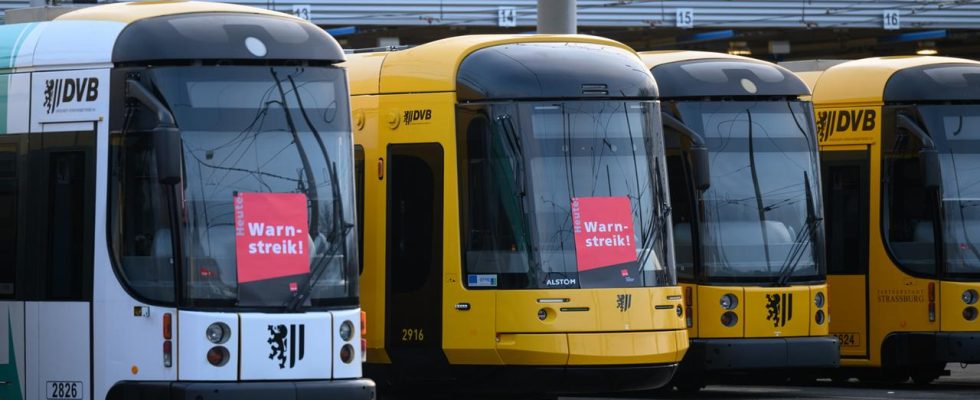Almost nothing works in local public transport today: more than 80 cities are affected by ver.di’s warning strikes, only Bavaria is spared. Bus, tram and subway staff demand, among other things, longer rest periods.
After airports, the ver.di union has been paralyzing local public transport with warning strikes in numerous cities and regions since early this morning. In more than 80 cities in 15 federal states, bus, subway and tram traffic is no longer working. Commuters, school students and other travelers have to look for alternatives. Only Bavaria is not affected, where the collective agreements run longer.
The strike is planned for the whole day in most municipalities. In Berlin it ended at ten o’clock. North Rhine-Westphalia is particularly affected. Of the around 90,000 employees nationwide who have been called on a warning strike, around a third work in the state.
The warning strike there began as planned at the start of the shift – usually between three and four in the morning, said Peter Büddicker from the ver.di regional district of North Rhine-Westphalia in the morning. The strike participation was high, said the trade unionist.
Money, working hours, breaks and vacation
There were similar reports from other federal states, such as Brandenburg, Lower Saxony, Saxony and Saarland. The background is parallel collective bargaining in local public transport in almost all federal states. In most rounds, the main focus is on the working conditions for employees.
Ver.di demands, among other things, shorter working hours without financial losses, longer rest periods between individual shifts, more vacation days or more vacation pay. This is intended to relieve the burden on employees and make the job more attractive.
Higher wages and salaries are also being negotiated in Brandenburg, Saarland, Saxony-Anhalt and Thuringia. In Brandenburg, for example, ver.di charges 20 percent – but at least 650 euros more for employees. According to ver.di, the term of the collective agreement should be one year. A new collective agreement for the transport companies is being negotiated in Hamburg.
Supporting Fridays for Future
The warning strikes are supported by the climate movement Fridays for Future (FFF). The organization is calling for better working conditions in the industry as a prerequisite for making public transport more attractive as an alternative to cars.
“Of course we as a climate movement can fight to ensure that climate targets in transport can be met and that emissions finally fall,” said Fridays for Future activist Luisa Neubauer in Berlin while visiting a warning picket of the ver.di union. “But in the end it won’t work if we ignore the conditions under which people work.”
Selfie with the strike leader: Luisa Neubauer in the morning in Berlin.
Hamburg airport also on strike
The Greens also expressed their solidarity with the strikers on Friday. These are “the everyday climate heroes,” said the chairwoman of the Green parliamentary group in the Bundestag, Katharina Dröge: “With their work, every day they ensure that millions of people in Germany travel in a climate-friendly manner and at affordable prices. That’s why the commitment to good working conditions is important .”
Ver.di is not just striking local public transport. The union also called on ground staff at Hamburg Airport to go on strike. The first arrivals and departures there in the morning were canceled – as planned. Already on Thursday there had been numerous flight cancellations at a total of eleven German airports due to warning strikes.

